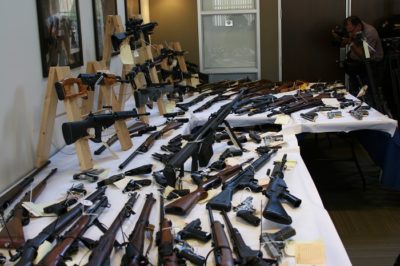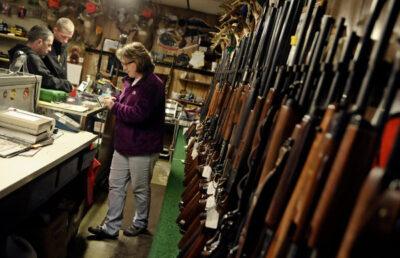 Judges would have the power to restrict individuals’ Second Amendment rights and order gun confiscations under a proposed California law aimed at the mentally ill.
Judges would have the power to restrict individuals’ Second Amendment rights and order gun confiscations under a proposed California law aimed at the mentally ill.
Assembly Bill (AB) 1014 would also give anybody the right to ask a judge to take such an action against a friend, relative, neighbor or co-worker.
“Under AB 1014, Second Amendment rights would be stripped away on as little as hearsay,” a petition on the website of the Firearms Policy Coalition, a gun rights group, alleges.
“With as little as a misunderstood Facebook post, your gun rights could be STRIPPED AWAY and your LIFE TURNED UPSIDE DOWN,” an email from the group says.
What would AB 1014 do?
Assembly Bill 1014 is designed to prevent mass shootings and to keep firearms out of the hands of the mentally ill. The bill introduced by State Assemblywoman Nancy Skinner (D-Berkley) was prompted by Elliot Rodger’s rampage in Santa Barbara on May 23.
“The proposed legislation would create a gun violence restraining order, establishing a system where concerned family members, intimate partners or friends can notify law enforcement of someone who is demonstrating a propensity to commit violence toward themselves or others,” a press release from Skinner states.
How to hide your guns, and other off grid caches…
Here is how the bill is supposed to work:
- A person who believed that somebody was mentally ill or capable of violence could ask police or prosecutors to obtain a gun violence restraining order (GVRO) from a judge.
- If police or prosecutors could convince the judge that the person was a threat, a GRVO would be issued.
- Police would then have the power to confiscate the individual’s guns.
- The person would be prohibited from legally purchasing guns in California.
- Presumably, the individual affected would have the right to contest the GRVO and challenge it in court.
- The judge would have the ability to reassess the GRVO at some point in the future.

Image source: NY Times
“A Gun Violence Restraining Order would allow a judge to temporarily stop an individual from buying or possessing a firearm,” Renee Binder, a professor of psychiatry at the University of California at San Francisco, wrote in a Los Angeles Times op-ed piece. “The judge would examine the situation and consider all the factors suggesting that the individual was a risk to himself and others. If granted by the judge, the restraining order would have to be reassessed after a short period to restore the individual’s firearm rights if he or she is no longer at serious risk of harming himself, herself or others.”
Skinner contends that a GRVO would have prevented Elliot Rodger from killing six people and injuring 13 others on May 23. News reports indicate that Rodger’s mother had told the Santa Barbara County Sheriff’s office that her son was a threat. The same news reports indicate that deputies investigated Rodger and determined he was no danger to the community.
“Because California doesn’t have a gun violence prevention restraining order, she didn’t have the ability to go to law enforcement or petition a judge, and ask to have, in effect, his ability to either possess or buy guns revoked,” Skinner told The Los Angeles Times.
How it could infringe on Second Amendment rights
The Firearms Policy Coalition listed some of the ways that AB 1014 could infringe on Second Amendment Rights. These infringements included:
- Gun owners subject to a GVRO would be prohibited from possessing firearms – without warning.
- Gun owners issued a GVRO would be subject to a “Firearm Seizure Warrant” and court-ordered confiscation.
- Law enforcement could seize guns “from any place, or from any person” — including from a person’s friends and family – “in whose possession the firearm may be,” at anytime.
Other potential problems with the GRVO process include:
- Decisions in the process would be made by judges, prosecutors and police with no real expertise in mental health issues.
- Complaints leading to a GRVO could be issued by anybody, including malicious individuals who just want to harm someone they didn’t like.
- The complaints could be made by laypeople who know little or nothing about mental health. A GRVO could be issued because a person considered somebody “weird” or “different.”
- Similar restraining orders designed to prevent domestic violence have not worked. There have been cases in which a person who applied for a restraining order was injured or killed by the subject of the order.
AB 1014 is currently before the California State Senate. It would have to pass both chambers and be signed by Governor Jerry Brown to become law.
Do you support or oppose the proposed California law? Tell us in the comments section below.
Sign up for Off The Grid News’ weekly email and stay informed about the issues important to you
 Off The Grid News Better Ideas For Off The Grid Living
Off The Grid News Better Ideas For Off The Grid Living



